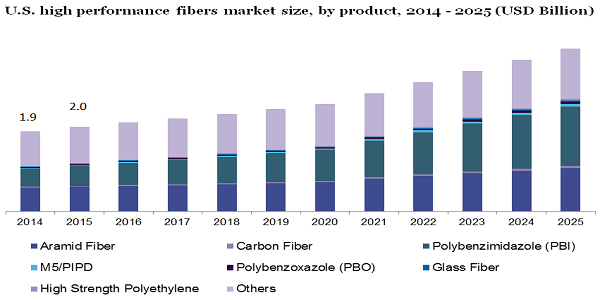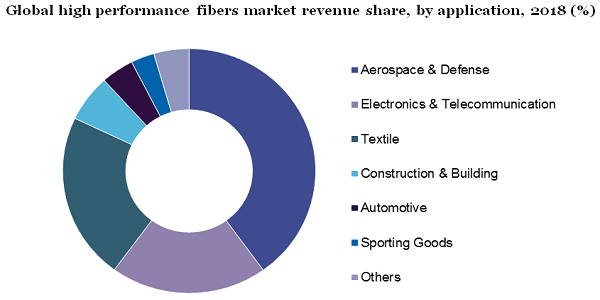- US: +1-408-610-2300
- Toll Free: +1-866-831-4085
- Become a Client
The global high-performance fibers market size was accounted for USD 12.2 billion in 2018. It is projected to grow at a CAGR of 11.0% over the forecast period, 2019 to 2025. The rising utility of high-performance fiber in composite reinforcement especially in electronics, military aircraft, and vehicles is expected to boost the market growth.
These fibers offer advanced features like high chemical and thermal resistance to organic solvents, non-conductivity, greater abrasion resistance at different temperatures. Additionally, these products provide high strength and rigidity for aerospace applications.

The manufacturers in the market follow stringent regulations regarding the material used for the manufacturing of aircraft. Authorities such as Federal Aviation Association (FAA), OSHA, EPA have set regulations regarding materials, waste disposal, and processing.
Technological advancement is projected to offer market growth opportunities for high-performance fiber (HPF). Key players are engaged in R&D to develop reinforced HPF composites and lightweight materials.
These fibers are used as substitutes in tires, bulletproof jackets, belts, and heat repellant cushions. Additionally, it is also used as fishing nets, ropes, and wind generator power blades. Various advantages like abrasion resistance and chemical features improve the quality of mooring ropes and protective gloves.
However, toxicity concerns about carbon-reinforced fibers may restrain the market growth. On the other hand, improved fuel efficiency, reduction in carbon emission is projected to bolster the demand for high-performance fibers.
Based on the product, the high-performance fiber market is fragmented into polybenzimidazole (PBI), aramid fiber, glass fiber, carbon fiber, polybenzoxazole (PBO), M5/PIPD, and others. In 2018, the carbon fiber segment held the highest share of over 25.2% in the overall market. Increasing demand for carbon fibers in aircraft components is contributing to the market growth.
Carbon fibers are very light in weight and highly effective. Thus, these fibers are expensive than metals. High cost interlinked with the product has limited its utility across spacecraft, jet fighters, racing cars, Boeing, and Airbus airlines.
Polybenzimidazole (PBI) segment is estimated to grow at a CAGR of over 14.5% from 2019 to 2025. The product provides benefits such as no melting point and high glass transition temperatures. PBI fibers are widely used in safety and heat garments including safety gloves, and firefighter uniforms.
PBI fibers offer low tenacity, high strength, low moisture regains, and high flexibility. Thus, these fibers are used for heat resistance and chemical filters in plastic reinforcement processing.
The Aerospace & defense segment is expected to register a CAGR of 12.1% over the forecast period. The growing focus on cost-effective and eco-friendly materials in aircraft manufacturing is boosting the market growth. Further, the increasing passenger traffic is projected to bolster the market growth.
Lightweight structures are beneficial in the aerospace industry, as they provide rigidness and high tensile strength with reduced fuel consumption. Moreover, these materials help in carrying more payload and fuel in the aircraft.

Rising demand for carbon fibers from the automotive sector is driving the growth of the HPF market. Furthermore, rising fuel prices are increasing the need for fuel-efficient vehicles.
The automotive segment is estimated to expand at a CAGR of more than 11.5% during the forecast period. The increasing trend of curb weight reduction is boosting the applications of fiber-reinforced materials. Curb weight reduction improves fuel efficiency and also reduces air pollution.
In 2018, the North American market contributed to the revenue of USD 3.6 billion in the overall market. The presence of global players and increasing spending on defense are supporting the market growth.
Strict regulations imposed by authorities including state bodies, ANSI, HSE are boosting the demand for protective clothing as a security measure in industries. This is projected to foster the demand for HPF in the next few years.
Asia Pacific is projected to expand at a CAGR of 11.3% from 2019 to 2025. The availability of raw materials at affordable prices and product development is escalating the demand for products across the electronics, and automotive industries.
In addition, the rising need for protection and security measures in the mining, military, construction, oil & gas sector is surging the product demand in developing countries such as India and China. These fibers are also used as an alternative to steel, and asbestos, which is expected to foster market growth.
COVID-19 pandemic has negatively impacted the global high-performance fibers market. Coronavirus has disrupted the supply chain of the automotive, aerospace, and electronics industries. Lockdown restrictions have set the limit on trade or transfer of raw materials nationally, and internationally.
Several automotive and aircraft manufacturing companies were shut down in the first and second quarters of 2020. This is projected to negatively impact the growth of advanced fiber products like carbon fibers, aramid fibers, PBI, and glass fibers. However, the resumption of various manufacturing facilities is expected to boost the market growth in the forecast period.
The market is highly competitive in nature with the presence of global & local players. High production costs of aramid fibers, M5/PIPD, PBI is posing challenges to market growth, and profitability.
Raw material supplier plays a vital role in the value chain of HPF, as they provide the basic raw material needed for manufacturing.
|
Attribute |
Details |
|
The base year for estimation |
2018 |
|
Actual estimates/Historical data |
2014 - 2017 |
|
Forecast period |
2019 - 2025 |
|
Market representation |
Volume in Tons, Revenue in USD Billion, & CAGR from 2019 to 2025 |
|
Regional scope |
North America, Europe, Asia Pacific, Central & South America & Middle East & Africa |
|
Country scope |
U.S., Canada, Mexico, France, Germany, U.K., India, Japan, China, South Korea, and Brazil. |
|
Report coverage |
Revenue forecast, competitive landscape, growth factors, and trends |
|
15% free customization scope (equivalent to 5 analyst working days) |
If you need specific information, which is not currently within the scope of the report, we will provide it to you as a part of the customization |
This report forecasts revenue growth at global, regional, and country levels and provides an analysis of the latest industry trends and opportunities in each of the sub-segments from 2014 to 2025. For this study, Million Insights has segmented the global high-performance fibers market report based on product, application, and region:
• Product Outlook (Volume, Tons; Revenue, USD Billion, 2014 - 2025)
• Carbon Fiber
• Polybenzimidazole (PBI)
• Aramid Fiber
• M5/PIPD
• polybenzoxazole (PBO)
• Glass Fiber
• High Strength Polyethylene
• Others
• Application Outlook (Volume, Tons; Revenue, USD Billion, 2014 - 2025)
• Electronics & Telecommunication
• Textile
• Aerospace & Defense
• Construction & Building
• Automotive
• Sporting Goods
• Others
• Regional Outlook (Volume, Tons; Revenue, USD Billion, 2014 - 2025)
• North America
• U.S.
• Canada
• Mexico
• Europe
• Germany
• U.K.
• France
• The Asia Pacific
• China
• Japan
• India
• South Korea
• Central & South America
• Brazil
• Middle East & Africa (MEA)


Research Support Specialist, USA